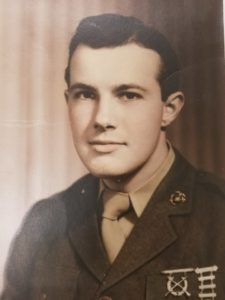“Even before the institution of the ceremonial economy, while the covenanted people of God were yet in bondage in Egypt, we find that they had their elders, that is, their men of gravity, experience, and wisdom, who were obeyed as heads of tribes, and rulers among the people.”
— Samuel Miller, Presbyterianism
Twenty-five years ago my father died. Hardly a day goes by when I don’t remember the brief years that I had him on this earth and often reach for and remember his God-wrought wisdom. I am so grateful for my two brothers whose godly integrity reminds me so much of my father. Dad was a son of the South Carolina Upcountry, a WW2 veteran, a businessman, and famously a Ruling Elder in the Presbyterian church.
The older I become the more I cherish the many practical ways Dad showed his love for the Lord by serving in the church, which later in his life came to be known as the Presbyterian Church in America (PCA), and specifically the local expression of the church where he served for a generation as a Ruling Elder. The Bible teaches that a good Elder should be a good father, and a good father looks after his family.
A Long Line of Godly, Ordinary, Christ-Exalting Elders
I now serve as a Ruling Elder in the same church of my father, sometimes even sitting in the same place he sat during Session meetings. It’s a church, I am delighted to say, that is characterized by a long line of godly, ordinary, Christ-exalting Elders for 125 years in the beautiful Upcountry, South Carolina. I am one of 18 Ruling Elders who, along with our 3 Teaching Elders, shepherd this congregation of 600 souls and collectively represent over 275 years of pastoral experience within the life of Second Presbyterian Church. Some of our Elders grew up Presbyterian, while others grew into Presbyterian conviction and—like J.R.R. Tolkien’s roused Ents of Fangorn in The Lord of the Rings—I have come to learn that there is almost no situation the Session can’t deal with in an appropriate fashion if required.
We’ve seen it all, together: church divisions, church growth, daughter churches, death, discipline, denomination apostasy/downgrade/reformation, family squabbles, heartbreak, identity confusion, marital strife, prodigals, societal upheaval, struggles, white flight, wickedness, widowhood, and the so-called worship wars. We’ve also seen God’s covenantal faithfulness to a multi-generational church family spanning three different centuries from the era of Reconstruction to Clemson’s National Championship in College Football this past January.
Altogether it adds up over the course of 125 years, 13,000 Sunday (morning and evening) services, 6,000 prayer meetings, 1,500 stated Session meetings, 500 Presbytery meetings (18 times as a host, with 25 of our Elders serving as Moderators), and 125 General Assemblies (twice as host, with 2 SPC men with connection to the church serving as Moderator), 119 Ruling Elders, 10 Stated Clerks, 10 Members of Presbyterian seminaries boards of trustees, and 12 Senior Ministers. In the ordinary course of life over 10,000 people have been ministered to by the Elders on 10 acres of land in the historic West End of Greenville, SC.
How did this happen…and why?
The Gifts of the Ruling Elder
When I was first ordained an Elder we were still being led by ordained men from the Greatest Generation who came of age in the WW2 era. I really loved these men. We all did. There was never an important decision made until we had heard from them. Sometimes during really difficult meetings, there would be moments of deep silence while we waited for our “elders” to speak. They were the kind of men who spoke seldom but, when heard, offered wise words like “apples of gold in frames of silver.” They were remarkable Christians with convictions and character, absolutely fearless and yet capable of profound gentleness. My pastor, Richard Phillips, once used the expression of one long-serving Ruling Elder, “He was both a lion and a lamb.” Another late Ruling Elder was said to have “a love for people and a passion for procedure-to-be-followed-fairly.” These men and many others helped train, by word and deed, the younger men who now serve. Truly there were giants in the land.
I recognize now that my church has followed the same rules of polity and more or less the same philosophy of ministry for most of its history. We believe the spiritual mission of the church is spiritual and we want our preachers to preach the Bible expositionally so that our hearts will be softened. We want our worship to transcend aesthetically and not feel transient or driven by contemporary tastes. We have a spiritual rhythm to our lives, we begin and end our Lord’s Day together, and we have taken the Lord’s Supper regularly. Like Dr. Hodge famously said of Princeton, we don’t want a new idea to come out of us except what is good and pure from the Scriptures. Our vitality has nothing to do with our antiquity, but our process was heavily informed by a theological memory.
Because our elders serve for life there is a remarkable amount of stability and institutional knowledge; certain men know the Book of Church Order, some have passion for personal evangelism and discipleship, one man organizes ministry to the local prison, several are Gideons, others are active Christian Rotarians, some do outreach initiatives to the local schools, others are gifted to counsel, facilitate organization, practice hospitality, business know-how, and others simply love to sing. Every one of the men is exceptional, and every one of the men has a demonstrative giftedness for loving the church. It’s understood in our church that a Ruling Elder will serve by working, giving up vacations, Saturdays, evening meals on behalf of the church, and attending all meetings—oftentimes “called” meetings. We’ve joked over the years that men’s ministry is becoming an officer.
As there were in the Church under the law, elders of the people for the government thereof, so in the Gospel Church, Christ has furnished others besides ministers of the Word with gifts and commission to govern when called thereunto, who are called ruling elders…Ruling elders possess the same authority and eligibility to office in the courts of the Church as teaching elders. They should, moreover, cultivate zealously their own aptness to teach the Bible and should improve every opportunity of doing so.
— Samuel Miller
I must confess that when I see and hear the concerns about “why won’t men serve as Ruling Elders in the PCA” it’s a little bit of an enigma to me. As a young man my Dad impressed upon me, “Son, you will serve in the Lord’s church.” I have come to appreciate what he was trying to instill within me. I have even come to love the imperative which he used.
I once heard Dr. Harry Reeder’s famous line—“Problem with the PCA is that the Teaching Elder is doing what Ruling Elders should do and Ruling Elders are doing what Deacons should do”—and I began to understand. Teaching Elders come and go, but Ruling Elders seem to live forever in a local church. The Book of Church Order describes the office of Elder by a number of characteristics, as demonstrating, functioning, or exhibiting: dignity, usefulness, bishop or pastor, exhorts, competent, blameless, soundness, and ability to rule his own house.
Serving for Life
I wonder if one of the big problems of the PCA is the lack of participation in the courts of the church by its Ruling Elders is not the fruit of modern notions of “term eldership.” At the last General Assembly, the Stated Clerk, Dr. Roy Taylor, reported that out of a total of 1,461 commissioners attending (a large number for PCA GA’s), there were 1,151 Teaching Elders and 310 Ruling Elders, representing 891 PCA churches from the United States and Canada. These 891 churches, in turn, are only half of our total church census.
In his book, How Jesus Runs the Church, Dr. Guy Waters offers a critique (without advocating against it) of term eldership saying that it “deprives sessions of the continuity, experience, and wisdom that longevity of service can afford the Ruling Elder. Term eldership therefore inadvertently hinders the session from becoming what it otherwise could be.”
In the PCA’s effort to make the office of Ruling Elder more accessible, have we hurt ourselves by making it a term office? Should the PCA, primarily through her Teaching Elders, not be raising the bar and the standards of men to train to be a Ruling Elder? I think so. My message is simple for those who have concerns about the PCA: train your men by holding a generational perspective, and teach your men to serve for life.

